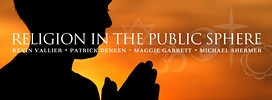In his response essay, Patrick Deneen attempts to prove that “classical liberals” have become “secular progressives” with evidence that many of the groups that supported the passage of the Religious Freedom Restoration Act (RFRA) now seek to limit its scope. Because I have worked closely on this issue and because Mr. Deneen specifically cited to Americans United’s website to make his point, I feel obligated to respond.
I see this shift away from full support of RFRA not as evidence that “classical liberals” have converted into “secular progressives,” but that “religious conservatives” have been working to morph RFRA into a law that many of its original supporters do not recognize. Religious conservatives are pushing to transform RFRA from a law that protects religious freedom into one that establishes religion by allowing it to “override other significant interests,”[1] including the rights of others.
When Congress conducted floor debates on RFRA, its Congressional supporters described the law as a way to prevent violations such as dry communities banning the use of wine in communion services, government meat inspectors requiring changes in the preparation of kosher food, the government regulating the selection of priests and ministers, or a public school forbidding a student to wear a yarmulke.[2] Notably, none of these examples involve for-profit entities or protections for religious activity that would cause harm to another or deny someone else his or her rights.
Now, however, RFRA is being used in ways supporters never imagined. Nonprofits and for-profits alike are trying to use RFRA to take away the rights of or to discriminate against others—often times with taxpayer funds. For example, the George W. Bush Administration used RFRA to trump nondiscrimination laws that forbid religiously affiliated government contractors and grantees from applying religious tests to taxpayer funded jobs. Similarly, religious organizations are currently arguing that RFRA trumps President Barack Obama’s recent executive order barring federal contractors from engaging in religious discrimination.
I of course agree that houses of worship have the right to adopt religious hiring restrictions for ministerial positions. But it seems outrageous to argue that a religious organization has a right to accept government funds and then refuse to adhere to the nondiscrimination provisions associated with those funds. For example, why should a religious organization be given taxpayer funds to run a government soup kitchen and then be allowed to hire only Christians to ladle the soup?
If the goal of religious conservatives were merely to “protect the integrity of their faiths, their churches, and their religious institutions,” then they would not apply for government contracts or grants when performance of that contract or grant would lead them to violate their own religious beliefs. Individuals and organizations do not have the right to insist on taking government funds to perform a service and then place their own religious litmus test on the funds.
Objecting to such an expanded use of RFRA doesn’t necessarily mean that the original supporters of the bill are changing course, but that the bill has been expanded way beyond its original form. RFRA was meant to be a shield to protect religion, not a sword to harm others.
It is also worth noting that, contrary to Mr. Deneen’s response, groups like Americans United support the use of RFRA by Christians as well as members of other faith groups. Obviously, Christians are protected under RFRA the same as everyone else. But the fact is, they often don’t have to use it. Christians are usually able to obtain justifiable exemptions and accommodations through the legislative process. It is most often religious minorities and non-theists who lack the political clout to obtain the exemptions and accommodations that would lift true religious burdens.
[1] Cutter v. Wilkinson, 544 U.S. 709, 722 (2005), available at http://www.law.cornell.edu/supremecourt/text/03-9877
[2] 139 Cong. Rec. S. 2822 (Mar. 11, 1993)( floor statement of Sen. Edward Kennedy), available at http://www.justice.gov/jmd/ls/legislative_histories/pl103-141/cr-s2822-24-1993.pdf; 139 Cong. Rec. S. 9821 (July 2, 1992) (floor statement of Sen. Orrin Hatch), available at http://www.justice.gov/jmd/ls/legislative_histories/pl103-141/cr-s9821-… .

